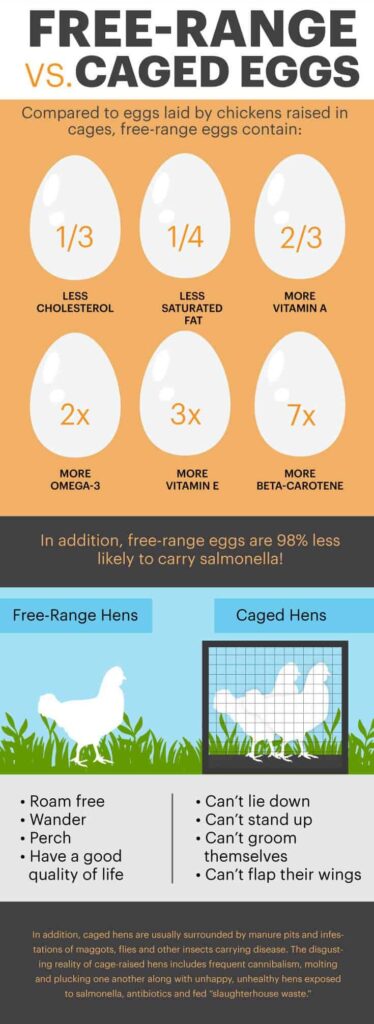In today’s health-conscious world, consumers are increasingly scrutinizing the food they consume. Eggs, a staple in many diets, have come under particular scrutiny, with debates raging about the best type to choose. While both conventional and cage-free eggs offer essential nutrients, there’s growing interest in the potential health advantages of cage-free eggs. This article delves into the differences between these two types of eggs, exploring their nutritional profiles and the impact on both human health and animal welfare.
This comprehensive guide will examine the key distinctions between cage-free and conventional eggs, highlighting the nutritional benefits associated with cage-free options. We’ll explore the specific advantages of omega-3 fatty acids and vitamin E found in higher concentrations in cage-free eggs, and discuss how these nutrients contribute to overall well-being. Furthermore, we’ll address the ethical considerations surrounding animal welfare in egg production, emphasizing the benefits of choosing cage-free eggs for a more compassionate food system.
Cage-Free vs. Conventional Eggs
The primary distinction between cage-free and conventional eggs lies in the living conditions of the hens that lay them. Conventional hens are typically confined to cramped cages, limiting their movement and access to natural behaviors. In contrast, cage-free hens have significantly more space to roam, allowing them to engage in activities like scratching, pecking, and socializing.
Cage-free systems vary in size and design, but generally provide hens with access to outdoor areas or larger indoor spaces with perches, nesting boxes, and other enrichment features. This increased freedom of movement and access to natural stimuli can positively impact the hens’ physical and mental well-being.
While both cage-free and conventional eggs are safe for consumption, the differences in living conditions can influence their nutritional content. Cage-free hens often have access to a more diverse diet, including insects, grasses, and other natural forage, which may contribute to higher levels of certain nutrients in their eggs.
Nutritional Benefits of Cage-Free Eggs

Both cage-free and conventional eggs are excellent sources of essential nutrients, including protein, vitamins (A, B12, D, E), and minerals (iron, zinc, selenium). However, some studies suggest that cage-free eggs may contain slightly higher levels of certain beneficial nutrients.
For example, cage-free eggs have been found to have a greater concentration of vitamin E, a powerful antioxidant that protects cells from damage caused by free radicals. Vitamin E also plays a role in maintaining healthy skin and vision. Additionally, cage-free eggs may contain higher levels of omega-3 fatty acids, which are essential for brain function, heart health, and reducing inflammation.
Omega-3 Fatty Acids and Vitamin E
Omega-3 fatty acids, particularly EPA (eicosapentaenoic acid) and DHA (docosahexaenoic acid), are crucial for maintaining optimal health. They support cognitive function, reduce the risk of heart disease, and promote healthy vision. While both cage-free and conventional eggs contain omega-3s, cage-free eggs tend to have a higher concentration due to the hens’ access to a more diverse diet that may include insects and plants rich in these fatty acids.
Vitamin E is another important nutrient found in higher amounts in cage-free eggs. This antioxidant helps protect cells from damage caused by free radicals, which can contribute to chronic diseases. Vitamin E also plays a role in maintaining healthy skin and vision. The increased vitamin E content in cage-free eggs may be attributed to the hens’ access to outdoor areas where they can forage for plants rich in this nutrient.
Health Advantages of Cage-Free Eggs

The potential health advantages of choosing cage-free eggs stem from their higher levels of omega-3 fatty acids and vitamin E. These nutrients contribute to overall well-being by supporting brain function, heart health, reducing inflammation, and protecting cells from damage.
Incorporating cage-free eggs into your diet can be a simple yet effective way to boost your intake of these essential nutrients. Whether you enjoy them scrambled, poached, or in an omelet, cage-free eggs offer a delicious and nutritious addition to any meal.
Animal Welfare Considerations
Choosing cage-free eggs is not only beneficial for human health but also aligns with ethical considerations regarding animal welfare. Conventional egg production systems often confine hens to cramped cages, restricting their movement and natural behaviors. This can lead to stress, injuries, and compromised well-being.
Cage-free systems, on the other hand, prioritize the hens’ welfare by providing them with more space, access to outdoor areas, and opportunities to engage in natural behaviors. By choosing cage-free eggs, consumers can support a more humane and sustainable food system that prioritizes the well-being of animals.
Conclusion
Are cage-free eggs better for you? The answer is nuanced. While both conventional and cage-free eggs provide essential nutrients, cage-free eggs offer potential health advantages due to their higher levels of omega-3 fatty acids and vitamin E. These nutrients contribute to overall well-being by supporting brain function, heart health, reducing inflammation, and protecting cells from damage.
Furthermore, choosing cage-free eggs aligns with ethical considerations regarding animal welfare, as these systems prioritize the hens’ well-being by providing them with more space, access to outdoor areas, and opportunities to engage in natural behaviors. Ultimately, the decision of whether to choose cage-free or conventional eggs is a personal one, but understanding the nutritional and ethical implications can help consumers make informed choices that align with their values and health goals.



